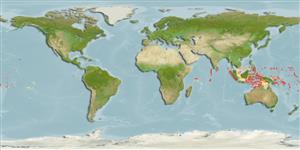Environment: milieu / climate zone / depth range / distribution range
Ecologia
marinhas associadas(os) a recifes; não migratória; intervalo de profundidade 6 - 40 m (Ref. 9790). Tropical; 10°N - 15°S
Indo-Pacific: Reunion east to American Samoa, south to Australia.
Tamanho / Peso / Idade
Maturity: Lm ? range ? - ? cm
Max length : 13.0 cm TL macho/indeterminado; (Ref. 9790); common length : 8.0 cm TL macho/indeterminado; (Ref. 9790)
Espinhos dorsais (total) : 9; Raios dorsais (total) : 11; Espinhos anais: 0; Raios anais : 11. Preopercle with a small antrorse spine. Infraorbital and suborbital ridges bearing many fine serrations. Preocular spines 2-3. Lower side of head bicarinate. Iris lappet slightly bilobed. (Ref. 9790).
Found in sandy areas of lagoons and seaward reefs. Usually caught with trawls in deeper water (Ref 90102).
Ciclo de vida ou comportamento de acasalamento
Maturities | Reprodução | Spawnings | Egg(s) | Fecundities | Larvas
Knapp, L.W., 1999. Platycephalidae. Flatheads. p. 2385-2421. In K.E. Carpenter and V.H. Niem (eds.) FAO species identification guide for fishery purposes. The living marine resources of the Western Central Pacific. Volume 4. Bony fishes part 2 (Mugilidae to Carangidae). FAO, Rome. (Ref. 9790)
Status na Lista Vermelha da UICN (Ref. 130435)
Ameaça para os humanos
Harmless
Uso pelos humanos
Pescarias: sem interesse
Ferramentas
Relatórios especiais
Baixar XML
Fontes da internet
Estimates based on models
Preferred temperature (Ref.
123201): 27.8 - 29.1, mean 28.5 °C (based on 114 cells).
Índice de diversidade filogenética (Ref.
82804): PD
50 = 0.5078 [Uniqueness, from 0.5 = low to 2.0 = high].
Bayesian length-weight: a=0.00525 (0.00246 - 0.01120), b=3.04 (2.85 - 3.23), in cm total length, based on LWR estimates for this (Sub)family-body shape (Ref.
93245).
Nível Trófico (Ref.
69278): 3.5 ±0.6 se; based on size and trophs of closest relatives
Resiliência (Ref.
120179): Elevada, tempo mínimo de duplicação da população menor que 15 meses (Preliminary K or Fecundity.).
Fishing Vulnerability (Ref.
59153): Low vulnerability (10 of 100).
